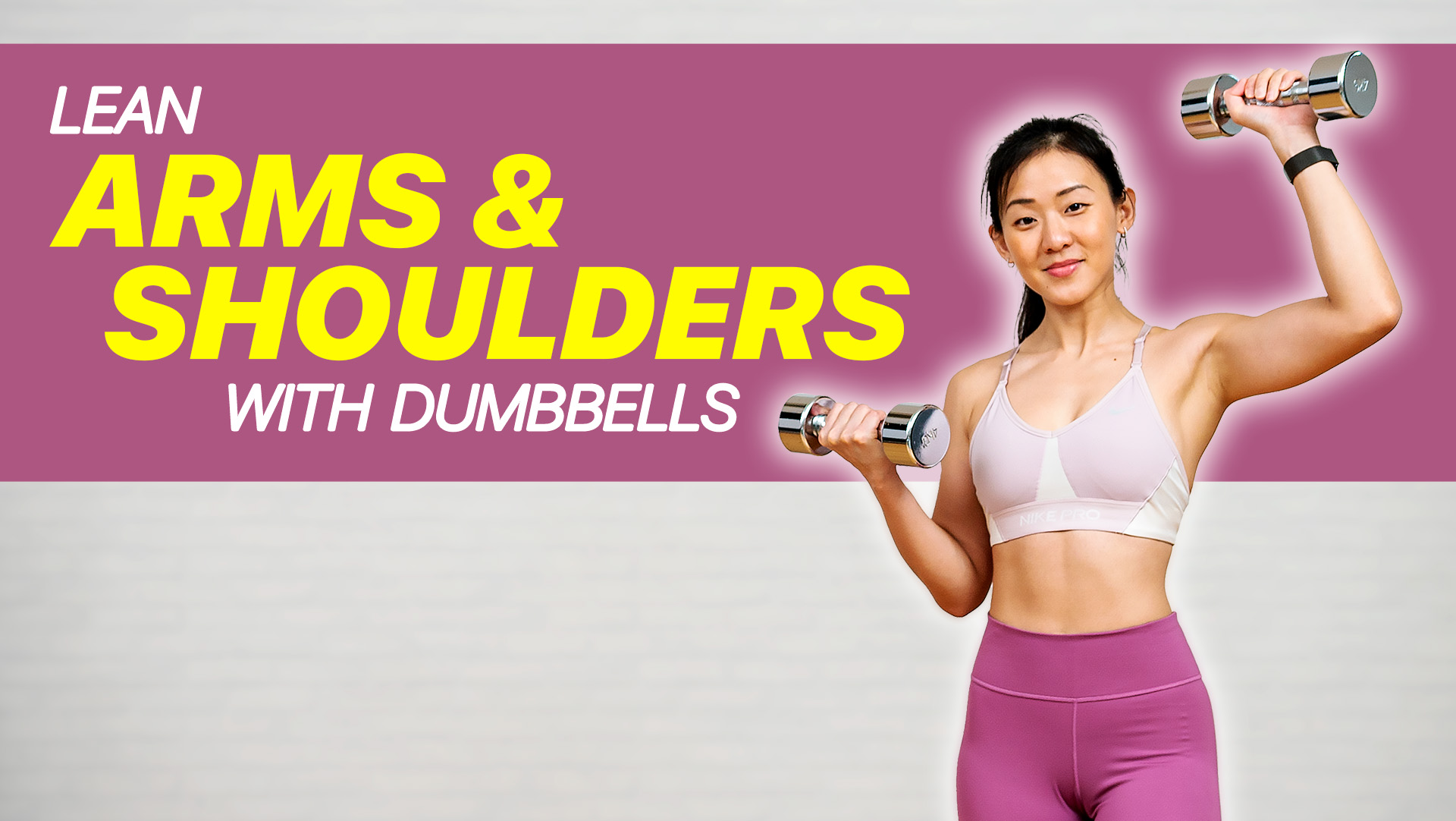Have you ever had a workout session where you felt like you were smashing it and gave your best? Whereas on some training days, you feel like it just wasn’t your best effort, although you tried. Perhaps you might have even experienced lightheadedness, sluggishness or muscle cramps during your workout.
There are lots of different factors behind it, but consuming the right pre and post workout meals can plays a huge role to your workout performance and results. They help you perform your best and shape your results.
Let’s take a deeper look into the purpose of pre-workout vs post-workout meals, meal timing and what you should be eating.
PRE-WORKOUT MEALS
Let’s first look at pre-workout meals. What is the role of consuming a pre-workout meal. It’s simple - to fuel your activity and give your body what it needs to perform at its peak. In order to do that, your body needs two things, Carbs and Protein.
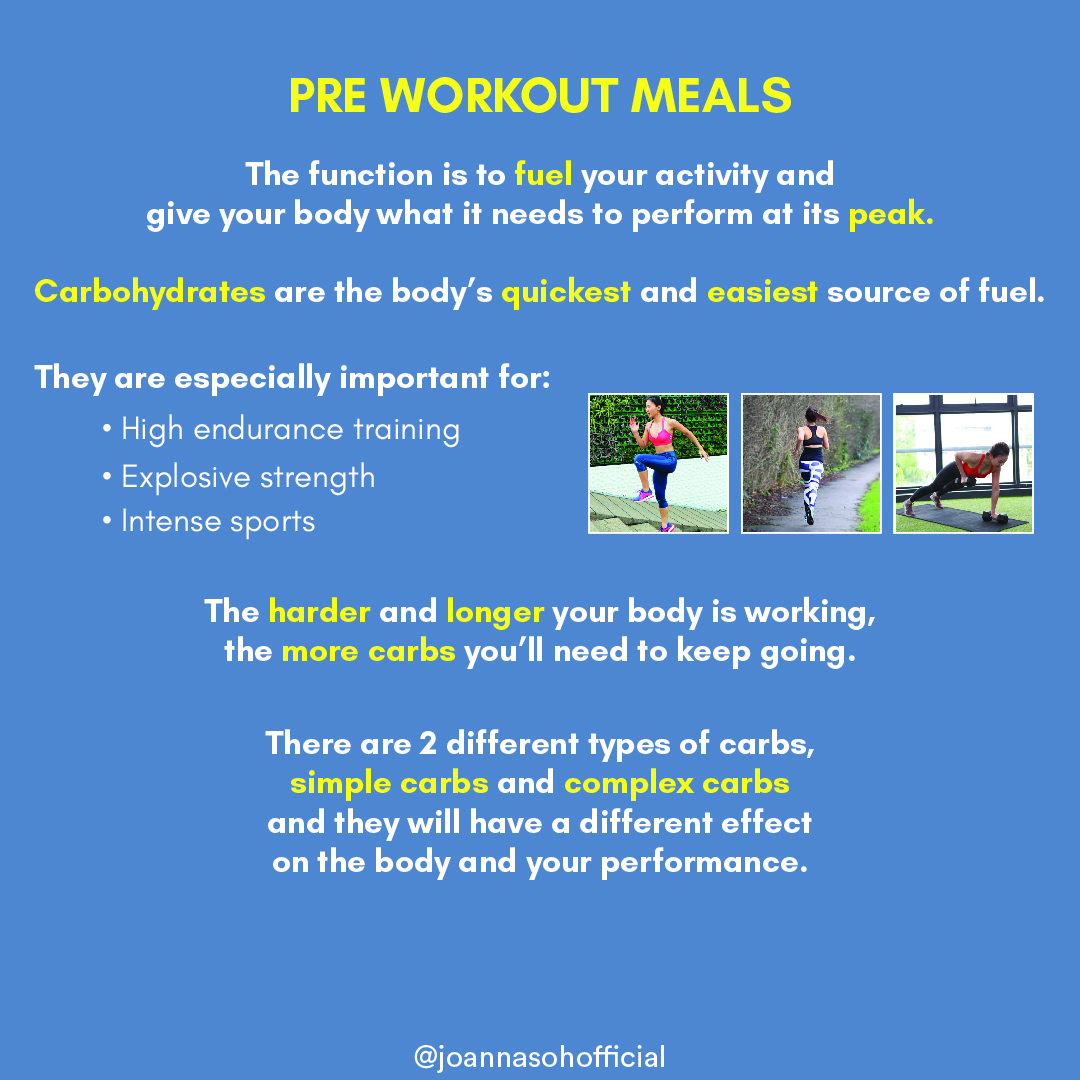
Carbohydrates are the body’s quickest and easiest source of fuel. They are especially important for high endurance training and explosive strength for example HIIT workouts, sprinting, power lifting, and other fast pace intense sports. And the harder and longer your body is working, the more carbs you’ll need to keep going.
There are 2 different types of carbs, simple carbs and complex carbs and they will have a different effect on the body and your performance.
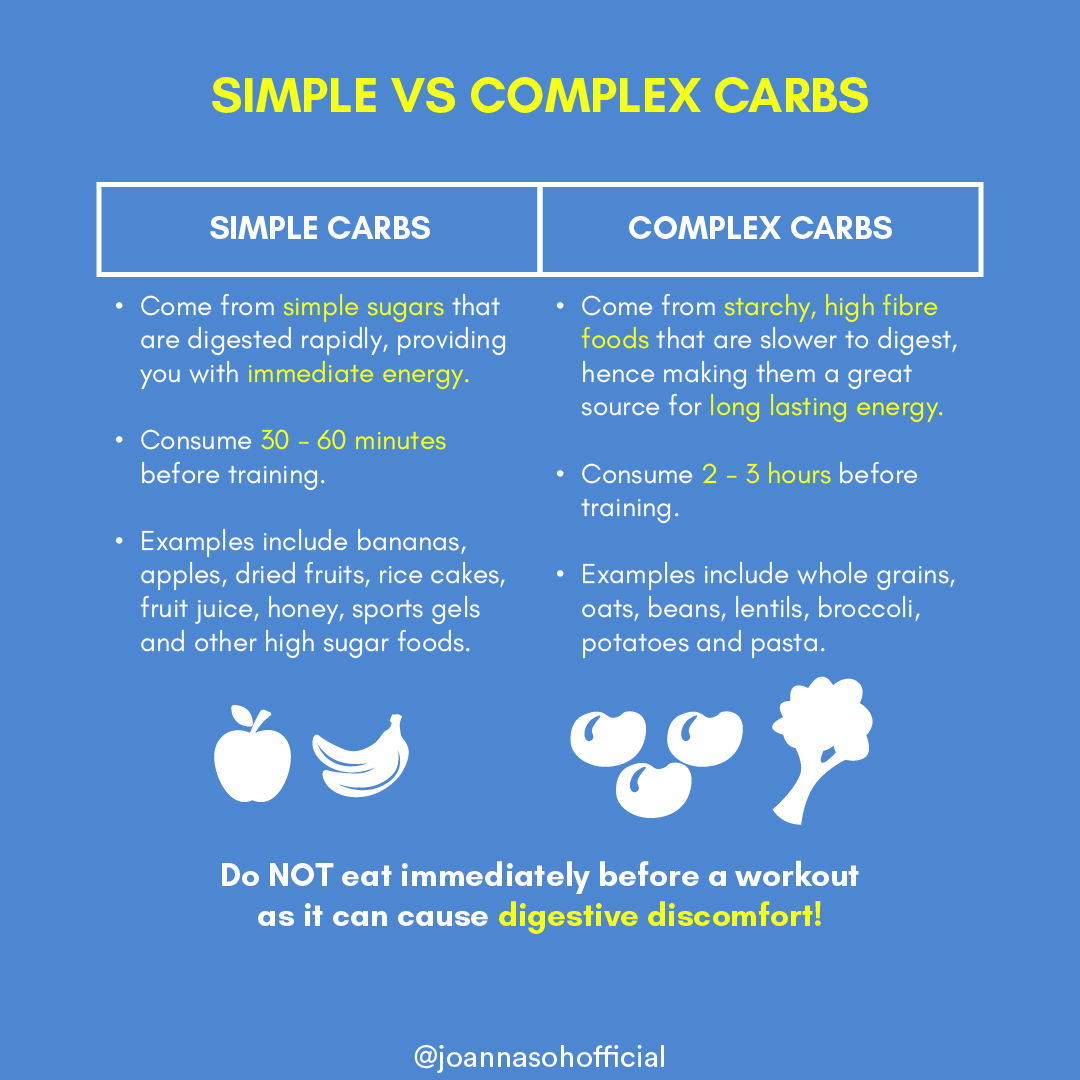
Simple Carbs or quick carbs come from simple sugars that are digested rapidly, providing you with immediate energy. Examples include fruits such as bananas, apples, dried fruits, rice cakes, fruit juice, honey, sports gels and other high sugar foods.
Complex Carbs or slow carbs typically come from starchy, high fibre foods that are slower to digest, hence making them a great source for long lasting energy. Examples include whole grains, oats, beans, lentils, broccoli, potatoes and pasta
Because complex carbs take longer to digest, it should be consumed 2 - 3 hours prior to your training. For instance it can be your lunch at 2pm and your training can be at 5pm. Simple carbs on the other hand, can be consumed within 30 - 60 minutes prior to training and it can be a small snack.
As general rule of thumb, do not eat immediately before a workout! Not only can it cause digestive discomfort, but this also creates competing demands on the body if your stomach is trying to digest food at the same time you’re pushing your muscle to perform.
Depending on the intensity and duration of your training, you may need to consume both simple and complex carbs. Say you were planning for a long run and sprint session that lasts up to 2 hours, then you’ll need to fuel your body with enough complex and simple carbs. However, if your training session only last between 45 - 60 mins, then a small snack with simple carbs is enough to fuel your performance.
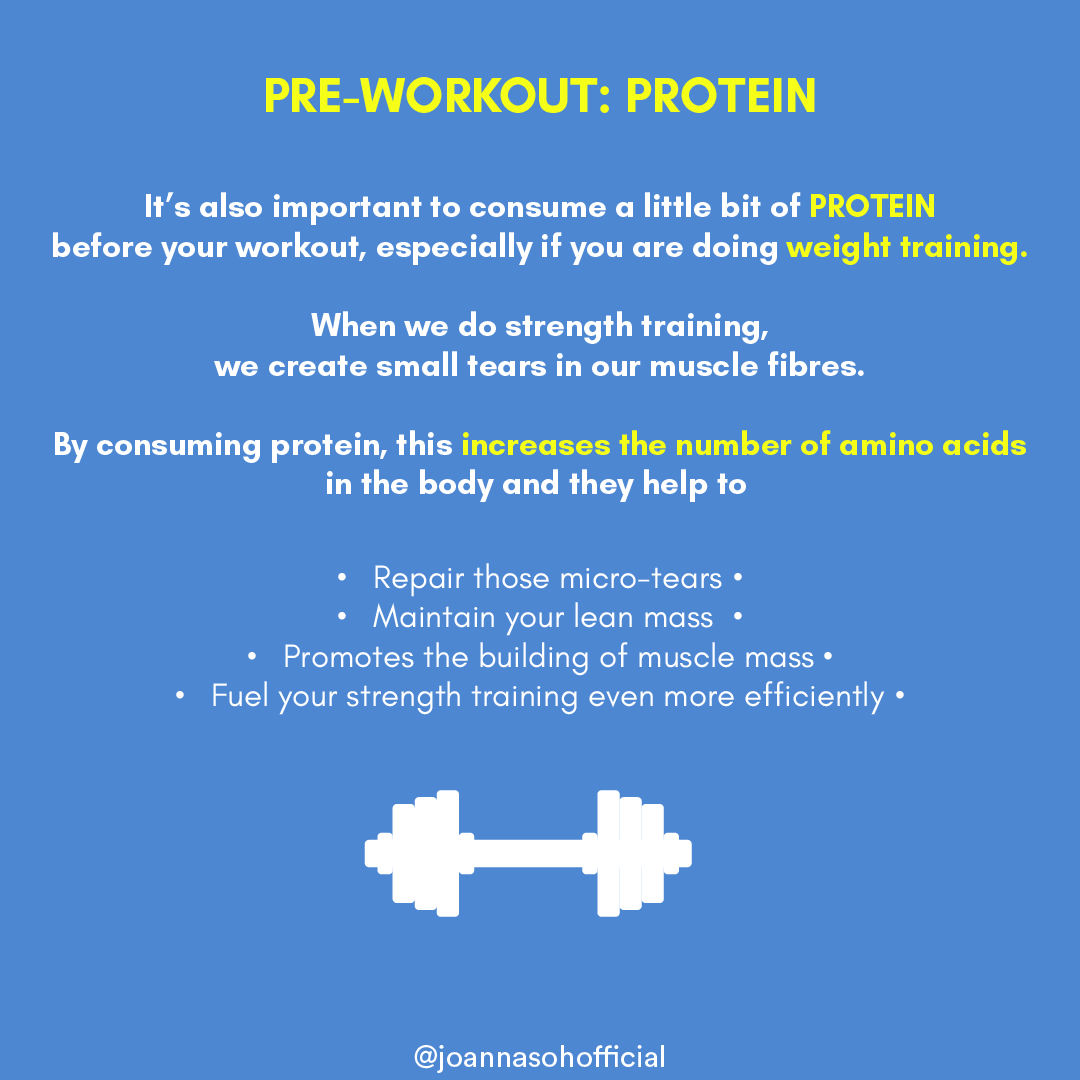
In addition to carbs, it’s also important to consume a little bit of PROTEIN before your workout, especially if you are doing weight training. When we do strength training, we create small tears in our muscle fibres. By consuming protein, this increases the number of amino acids in the body and they help to repair those micro-tears, maintain your lean mass, promotes the building of muscles mass and fuel your strength training even more efficiently.
Here are some great pre-workout snacks that include a balance of simple carbs and protein:
- Banana
- Peanut Butter & Banana Sandwich
- Yoghurt with Fruits
- Handful of Nuts and Dried Fruits
- Instant Oatmeal with milk and fruit
- Eggs
Supplements can also be useful before exercise. It can help to enhance performance, improve strength, reduce fatigue and increase lean muscle mass. 2 of my favourite supplements which I do consume pre-workout are caffeine and BCAA.
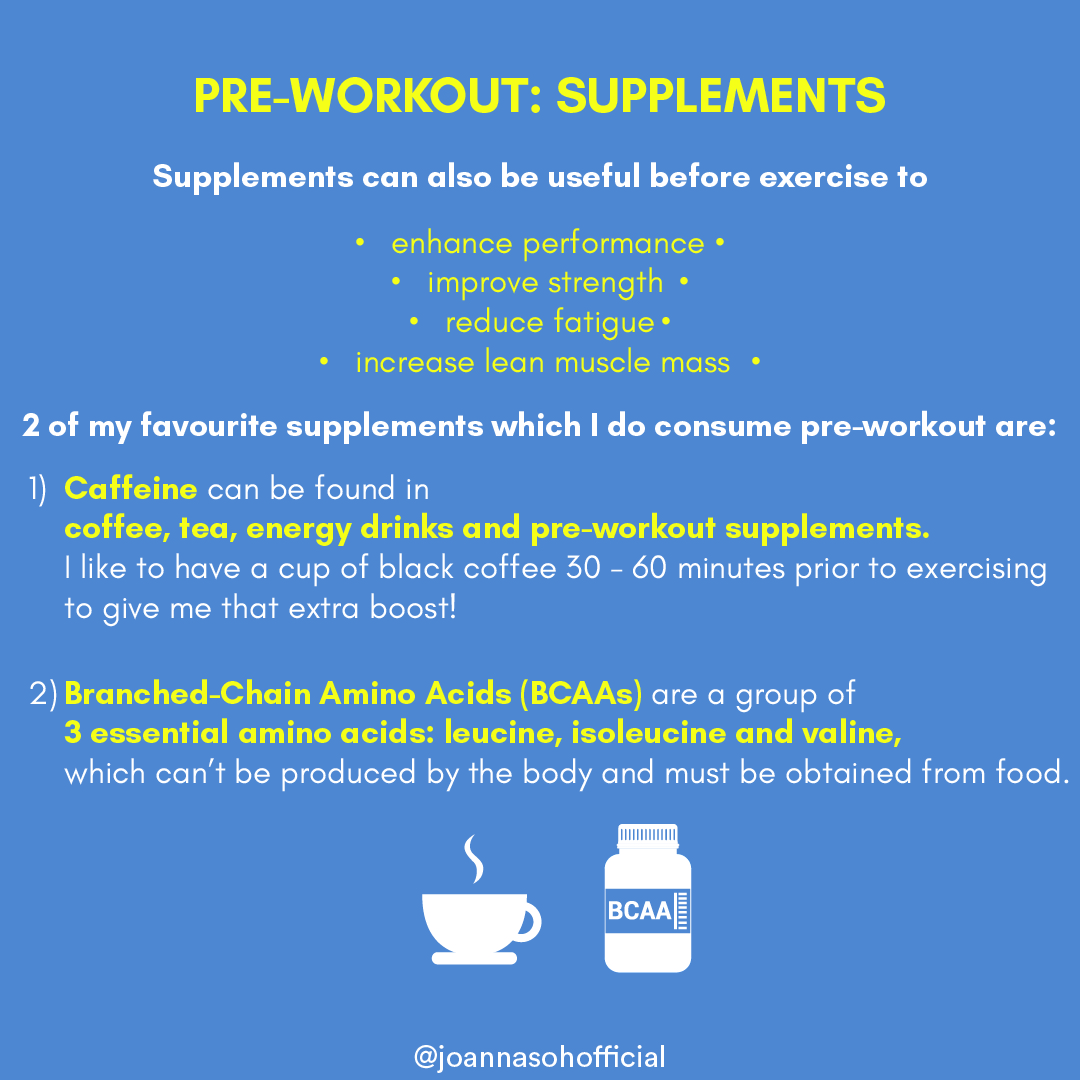
- Caffeine can be found in coffee, tea, energy drinks as well as pre-workout supplements. It has been shown to improve performance, increase strength and power, reduce fatigue and stimulate fat burning. Personally, I like to have a cup of black coffee 30 - 60 minutes prior to exercising to give me that extra boost!
- Branched-Chain Amino Acids (BCAAs) are a group of 3 essential amino acids: leucine, isoleucine and valine, which can’t be produced by the body and must be obtained from food. It is one of the most common sports supplements consumed pre and also during exercising, to boost muscle growth and enhance exercise performance and they may also help with weight loss and reduce muscle soreness after exercising.
POST-WORKOUT MEALS
Now that you know what to eat before your training for you to maximise your performance, what you consume AFTER your training is equally if not even more important. The main purpose of a post-workout meal is to supply your body with everything it needs to rehydrate, repair, replenish, refuel, recover and keep improving your future performance. Once again, your body needs both Carbs and Protein. However, the emphasise for post-workout is on PROTEIN.
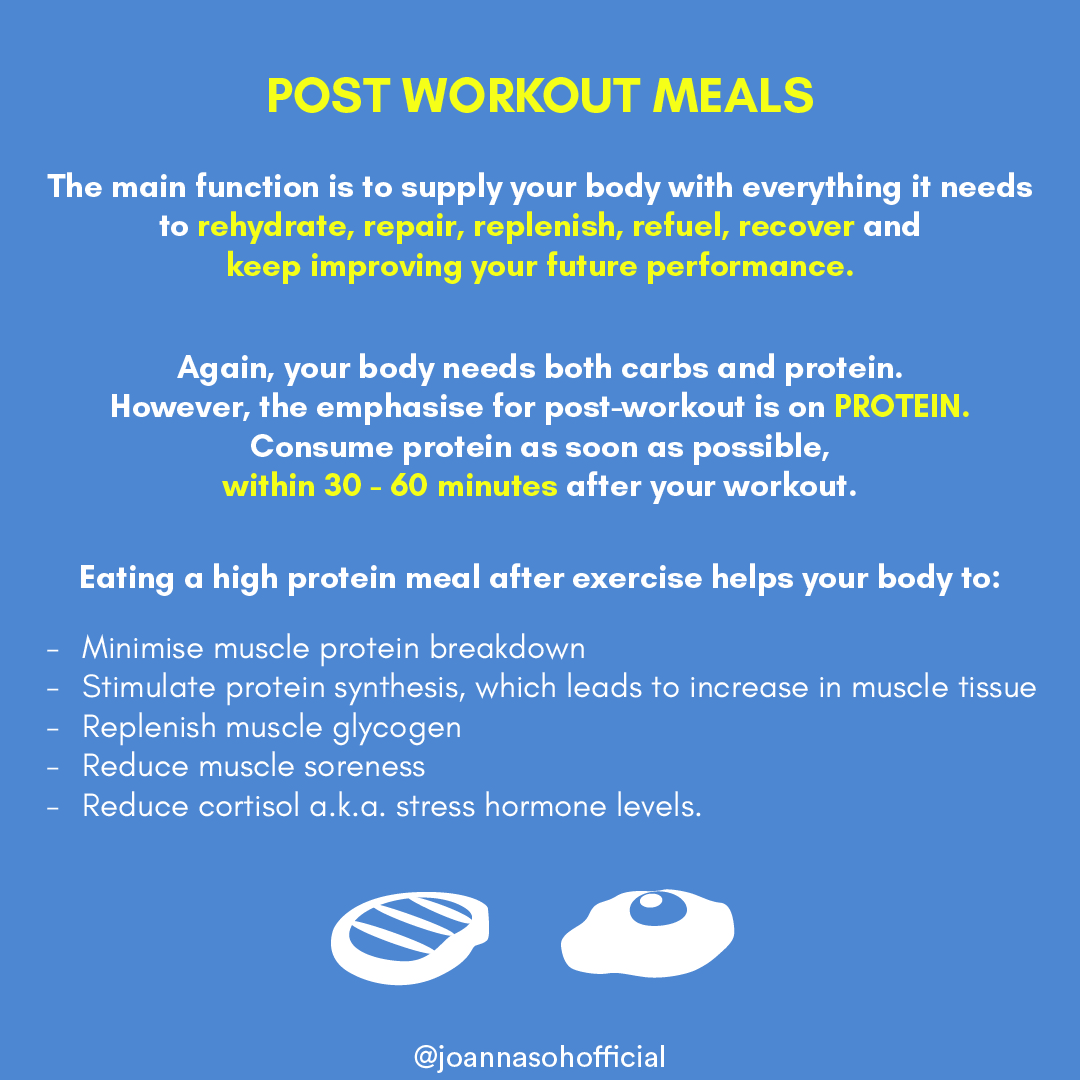
Eating a high protein meal after exercise helps your body to:
- Minimise muscle protein breakdown
- Stimulate protein synthesis, which leads to increase in muscle tissue
- Replenish muscle glycogen
- Reduce muscle soreness
- Reduce cortisol a.k.a. stress hormone levels
How soon should you consume your post-workout meal? Simple answer is as soon as possible - within the first 60 minutes after your workout, or even better, within the first 30 minutes. Why is the timing of your post workout meal crucial? If your body has exhausted all its reserves during the workout, it will resort to breaking down muscle in order to fuel itself. And we want to avoid that as it’s not easy to build muscle mass.
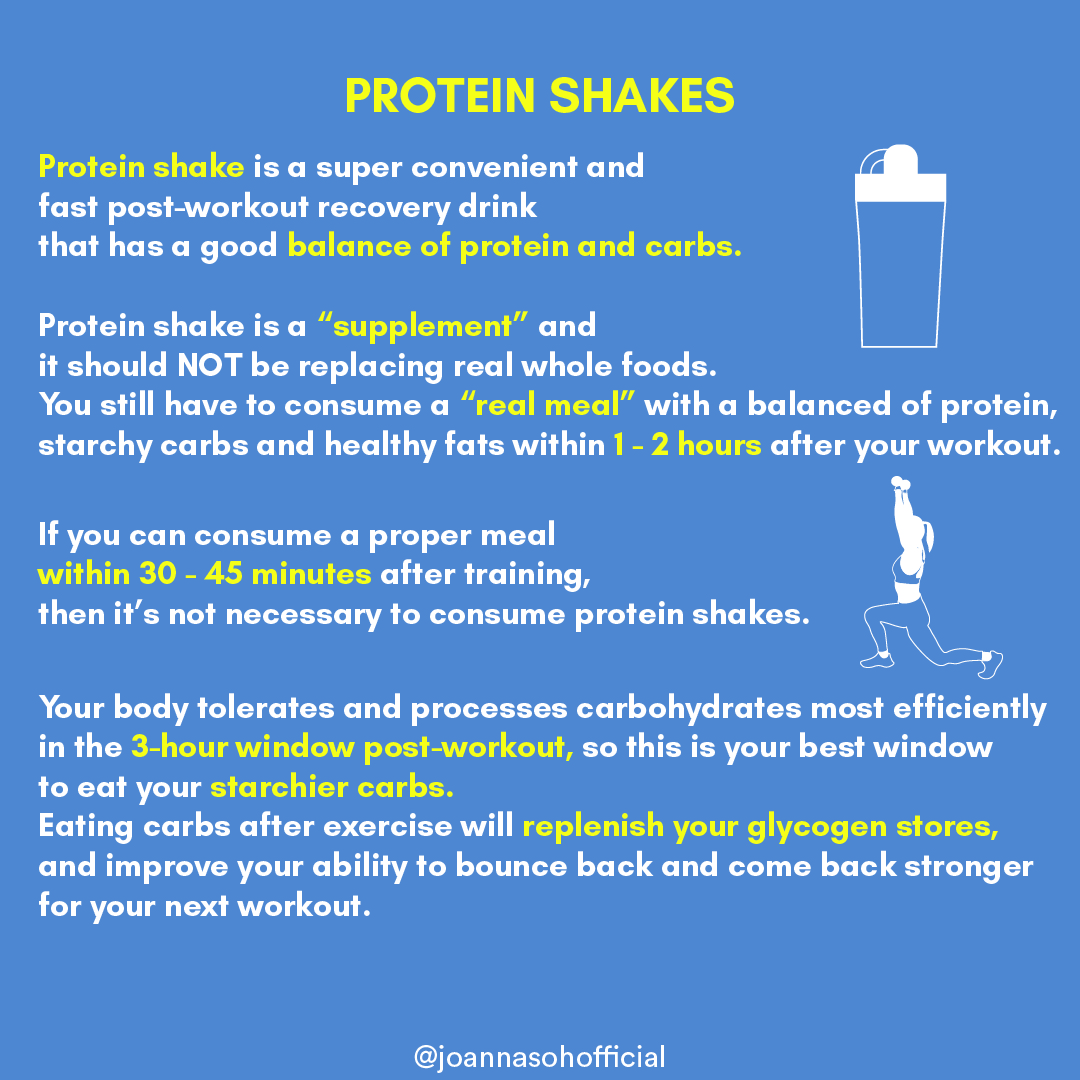
I’m sure we’ve seen fitness people consuming a protein shake immediately after their training session.That’s because protein shake is a super convenient and fast post-workout recovery drink that has a good balance of protein and carbs. And sometimes, you may find that your appetite is suppressed following a tough workout, making liquid nutrition a more appealing option.
Some of you may ask, “Is it enough to just consume protein shake? Do I still need to consume a “real meal”?” The answer is YES! Remember that protein shake is a “supplement” and the purpose is to “supplement” your diet. It should NOT be replacing real whole foods.
You still have to consume a “real meal” with a balanced of protein, starchy carbs and healthy fats within 1 - 2 hours after your workout. Your body tolerates and processes carbohydrates most efficiently in the 3-hour window post-workout, so this is your best window to eat your starchier carbs. Eating carbs after exercise will replenish your glycogen stores, which you’ve used up during your workout, and it will also improve your ability to bounce back and come back stronger for your next workout.
Another common question is, “Is it a must to consume protein shakes post-workout?” The answer is NO. If you’re able to consume a proper “real meal” within 30 - 45 minutes after you finished training, then it’s not necessary to consume protein shakes. Protein shakes act as a supplement which is super convenient and easily accessible.
As a general guideline, a post-workout meal should contain
Protein = 0.25g per pound of your target body weight.
Carbs = 0.25 - 0.5g per pound of your target body weight.
Remember this is just a guideline. If you were to perform more intense weight training session that lasts up to 90 minutes or if your goal is to build more lean muscles, then you may require more protein in your diet. Here are some examples of post-workout meals:
- Vegetable Omelet with Roasted Potatoes topped with Avocado
- Baked Fish with Grilled Vegetables and Rice
- Chicken Breast on Whole Grain Wrap and Salad
- Beef Spinach Frittata
- Tempeh Stir Fried with Rice
IN SUMMARY
The bottom line is that you need both carbs and protein pre and post workout for sustained energy, improved performance and better muscle recovery.
There isn’t a one-size-fits-all solution when it comes to eating the right meals and timing. You have to keep trying different meals and timing and see which fits your body and the type of activity you do. For example, I perform better when I consume a small snack 30 minutes before training, whereas some of you might find that you need at least an hour window of eating prior to exercising. It’s important to remember that your pre and post-workout snacks should be included as part of your total daily caloric intake.
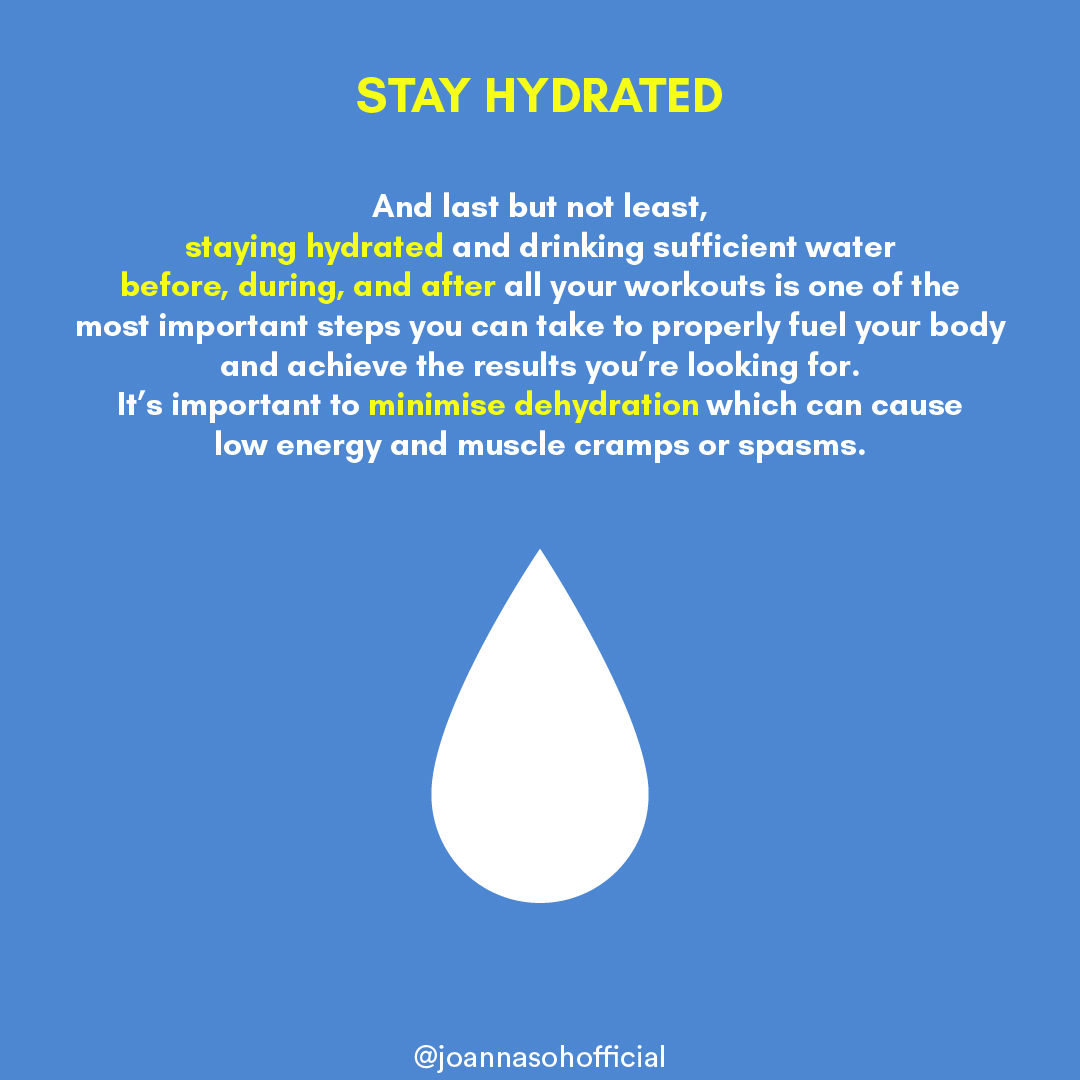
And last but not least, staying hydrated and drinking sufficient water before, during, and after all your workouts is one of the most important steps you can take to properly fuel your body and achieve the results you’re looking for. It’s important to minimise dehydration which can cause low energy and muscle cramps or spasms.
_


